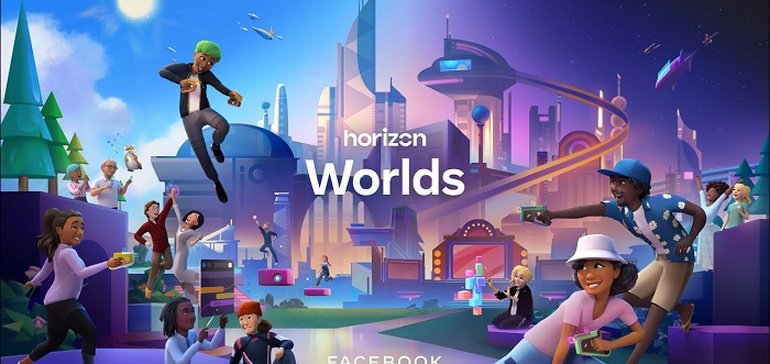Mobile App Development, Social Media
Meta’s VR Worlds are Growing Fast, with Usage Climbing Above 300k Monthly Actives
- By Brett Belau
18 Feb

As Meta continues to spruik its metaverse shift, VR is clearly a key focus element, and with sales of Meta’s VR headsets on the rise, it could well become the next big platform for digital connection.
And that future could be closer than you might think, with The Verge reporting that users of Horizon Worlds, Meta’s evolving social VR platform, are rising fast. According to reports, both Horizon Worlds and Horizon Venues, Meta’s VR events space, are now being used by a combined 300,000 people each month, a 10x increase since the launch of Horizon Worlds in December.
Which is probably not a huge surprise, given the jump in sales of Meta’s Quest 2 VR headsets over the holiday season.
Indeed, income from Meta’s Reality Labs division increased by $319 million in Q4 (quarter-over-quarter), and with the Quest 2 selling for $299 USD, that’s a lot of units potentially making their way into homes around the world.
The next question then is how much time are these people spending engaged within the VR space.
While the Quest 2 is impressive, and the development of Meta’s VR environments is evolving quickly, there’s still a way to go in making this a truly engaging interactive experience.
Meta hasn’t provided expanded usage data as yet, though it did recently report that over 10,000 environments have been created in its Horizon Worlds VR development space.
You’d have to assume that those take some time to build, and assuming also that these weren’t all created by Meta’s own development team, that does suggest that some people are spending a lot of time in VR, as it gradually evolves into a more critical engagement space.
It’s not the full metaverse vision yet, the ‘Ready Player One’ style transformative alternate reality, where people can spend entire days drifting from one experience to another. But it is beginning to take shape, and as more options are added in, and more developers warm to the VR space, it does look set to become an important connective tool for the future, if not the key platform that will supersede the current social media experience.
Which is definitely where Meta sees things headed. Meta CEO Mark Zuckerberg recently outlined the importance of the Horizon platform in Meta’s Q4 earnings call:
“Horizon is core to our metaverse vision. This is our social VR world-building experience that we recently opened to people in the US and Canadam and we’ve seen a number of talented creators build worlds like a recording studio where producers collaborate or a relaxing space to meditate. And this year, we plan to launch a version of Horizon on mobile too, that will bring early metaverse experiences to more surfaces beyond VR. So while the deepest and most immersive experiences are going to be in virtual reality, you’re also going to be able to access the worlds from your Facebook or Instagram apps as well, and probably more over time.”
It’ll be interesting to see how those integrations take shape, and how Meta is able to build, essentially, windows into the Horizon environment via its current apps and platforms.
Maybe, it will be similar to gaming worlds, where you’ll be able to use your Meta avatar to explore the 3D space, like Fortnite or Roblox, but aligned specifically to Horizon Worlds. That would then enable people to interact via alternating types of inputs, and that type of interoperability will be critical to the future Metaverse shift.
Such developments could generate a lot more exposure for VR creation, and get more people buying their own Quest headsets for the full experience. And if you’re on the go, you’ll still be able to stay in touch with the latest happenings in the space via your phone, with the combined connective options helping to build the broader Metaverse social and collaborative experience.
It’s not there yet, we’re still in the early stages of this development, and Meta itself has repeatedly noted that it will take years, potentially more than a decade, to see this medium take full form. But you can see the outlines now, the elements that will combine to create this new experience.
And if it plays its cards right, Meta will be both the architect and the host of the next shift.
Meta has also repeatedly noted that no one company will own the Metaverse, that it will be built by a combination of developers and partners, all collaborating and working together on the next stage. But really, in this vision, it’s Meta that’s building the foundations, which partners will then need to iterate on.
Again, it’s still too early to say how it will all come together, but as it becomes clearer, it seems fairly obvious that Meta has a strong lead in the space, and the capacity to become the facilitator of the next shift.
It’ll be interesting to see how Meta looks to build in these next elements, and how each further contributes to engagement in the VR space.
Source: www.socialmediatoday.com, originally published on 2022-02-18 14:18:41
Connect with B2 Web Studios
Get B2 news, tips and the latest trends on web, mobile and digital marketing
- Appleton/Green Bay (HQ): (920) 358-0305
- Las Vegas, NV (Satellite): (702) 659-7809
- Email Us: [email protected]

© Copyright 2002 – 2022 B2 Web Studios, a division of B2 Computing LLC. All rights reserved. All logos trademarks of their respective owners. Privacy Policy

![How to Successfully Use Social Media: A Small Business Guide for Beginners [Infographic]](https://b2webstudios.com/storage/2023/02/How-to-Successfully-Use-Social-Media-A-Small-Business-Guide-85x70.jpg)



![How to Successfully Use Social Media: A Small Business Guide for Beginners [Infographic]](https://b2webstudios.com/storage/2023/02/How-to-Successfully-Use-Social-Media-A-Small-Business-Guide-300x169.jpg)


Recent Comments